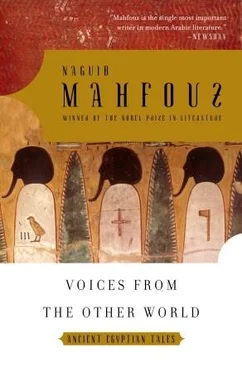But the high priest was horrified, and implored him, “I cannot, my lord. . My duty is to serve my God, not to bring down kings.”
Userkaf fell silent for a moment, following with his two stern eyes the eyes of the priest, which avoided his own. Then the king turned his back on him abruptly, and left the temple, sick in his soul, his chest tightening, while he gnawed at his fingers in grief and chagrin.
He proceeded hurriedly to the palace of the vizier Horurra, demanding permission to see him. But the servants mocked his wretched appearance, and started to throw him out. He begged and pleaded with them, but this only made them more arrogant. He then told them that he was a friend of the minister’s, and mentioned a name that proved his intimacy — so they let him inside. When the vizier’s gaze fell on the man coming toward him, he stood stiff with fright, his limbs frozen and his eyes open wide, and he gasped without thinking, “My lord!”
“May the God treat you kindly, my dear friend, Horurra,” said the king.
“Did anyone see you enter my house?” the vizier asked, his heart dismayed.
The king pondered the reason behind this question, and said, beginning to sink into woe and despair, “Yes, my friend — the servants and the guards who gather at your door.”
“Did any one of them recognize you?”
“I know not,” the king replied.
The vizier sighed, “What a calamity if the king knew of your visit to my house.”
“Do you fear this upstart?”
“How could I not?” said the vizier. “You had best leave my palace by the back door.”
“My dear friend, Horurra — are you turning me away?”
“Please forgive me, but I’m in difficult straits — I implore you in the name of our old friendship.”
Pharaoh laughed derisively, seeing his chief minister in an anxious state that he could only bewail. He saw that hope was useless, and that there was no choice but to quit the palace from the rear entrance, as his friend had wished. So he did depart, as the anguish and regret welled up within his breast.
Of all his friends, none remained but General Samunra. Despite all the failure he had just experienced, the king’s bitter forebodings did not vanquish his unshakeable confidence in his commander-in-chief, who was a gallant, noble, and utterly earnest man. The gods had singled him out with a nature that neither treachery nor worldly goods could seduce. So, placing his last hopes upon him, Userkaf asked for permission to go in to see him. When his eyes fell upon him, the king’s heart yearned for him and he called out, opening his arms wide to embrace him, “O General Samunra, don’t you remember me?”
Flabbergasted, the commander stood up in alarm saying, “My lord, King Userkaf!”
“Yes, it is he himself, in all his misery and remorse.”
The general did not see the king’s open arms, while his face showed the signs of hardness and severity. He asked his former suzerain sternly, “Does His Majesty the King know of your entering his kingdom?”
Userkaf was taken aback; his arms dropped in deep disappointment.
“No,” he said tersely.
“What did you come to do in Egypt?”
“I came to call out for help to my old friends.”
The general approached the king, saying in a military voice, “My duty as commander of the Egyptian Army requires that I arrest you in the name of Pharaoh.”
“Do you not realize that I am the legitimate king?”
The general said, as he laid his hand upon Userkaf’s shoulder, “Egypt has only one king: I know no other.”
Convinced that argument was futile, Pharaoh surrendered himself to Samunra. He followed him to the royal palace, where the commander entered the great hall of the throne, halting before the king. Userkaf looked upon his son seated in his own place, around him his own men of state. At their head were Horurra and Samun: he knew that these two had gone straight to Sahura together to tell of his own appearance. And within himself he lauded the two of them coming to give witness. With them, the general would testify to Userkaf’s return to the throne, pledging him the loyalty entrusted to the faithful hands of his son. Together they had tasted the shame and disgrace that had tortured their wicked souls — and now were driven to repentance.
The king gazed at his son with a meaningful smile. But just as he was about to speak, he heard a dog’s loud barking. He saw Zay cutting through the ranks of the guards, rushing up to him with irresistible force. Pharaoh stroked him with his hands, treating him with a deep concern that bespoke his ardent love and yearning. At the same time, he was not able to control his rage or to calm his mind except with a mighty effort. Then — yielding at last to his fury — he strode firmly up to the throne until he stood before the guards. He looked upon his son with consternation, saying, “Rise, my son, for my experiment is finished. Invite me to appear before these hypocrites.”
But his son did not rise, nor vacate his place for him. Instead, he said to him, with the majesty of authority, “What have you come to do here? You — the man to whom the gods gave a vast kingdom — but who disdained his right, and went to dally in the land of Punt?”
The son’s speech settled on his father like a sentence. His eyes widened and his amazement grew to madness; his stupefied face kept turning back and forth between his haughty son and his gloating men. Losing his tolerance, Sahura burst out cruelly.
“I am now entitled to sever your head from your body. But I have not forgotten that you are my father. I would prefer to avoid this crime that our traditions condemn. Therefore — having opened my breast for you patiently — I grant you a day to prepare yourself. You will then go to the land of Nubia. ”
His retinue extolled the charitable act of the king, their tongues ceaselessly showering him with prayers of praise. As for Userkaf, his sense of tribulation intensified until his own tongue was tied and his limbs were paralyzed. Meanwhile, his dog Zay sensed his pain; he kept on barking and tugging on his cloak that was covered with dust from his wanderings.
The king then roused himself against his weakness, and spoke to his son, “And Queen Tey?”
“She is now the queen of contented Egypt.”
The king sighed and asked, “May I be so bold as to ask that Zay might accompany me?”
“That I grant you — his barking annoys us.”
So the king left the land of Egypt in guilt and sadness, humiliated by his misfortune. As he headed into exile, his faithful dog followed him. He arrived in the land of Nubia, where he lived among its mountains in fearful isolation, speaking to no one. But as his cares and angst pressed down upon him, the solitary creature that showed him love and devotion, bearing the pangs of deprivation patiently for his sake, gave voice to his complaints.
The governor of Nubia did not leave him alone for long. He visited him and invited him to visit as well, withholding from him neither warmth nor welcome. He wasted no time in revealing his hidden self. Userkaf found him a grumbler who saw his station in Nubia as an offense against his person, which showed a lack of appreciation for his services and qualifications. And therefrom glimmered in the heart of the king a gleam of hope. He exploited the governor’s discontent, indulging his delusions, until the disgruntled man consented to dispatch Nubian and Egyptian troops northward, with Pharaoh at their lead. Sahura readied his own army to rebuke them: the two armies met in a decisive battle — in which Userkaf triumphed. He entered his capital as a conquering king, arrested his son and his friends of yore, and threw them into the dungeon.
When Queen Tey learned of the victory of her former husband’s army she succumbed to terror, and took her own life — thus robbing Userkaf of the opportunity to avenge himself upon her. But, in reality, the king was not ready to make any decisions, nor to decree the fate of any of his prisoners until his anger had cooled and the intoxication of his victory had subsided. He took the time to review, to contemplate, and to consider. He stayed up a long evening thinking and reflecting, until, finally, he was guided to an opinion.
Читать дальше












